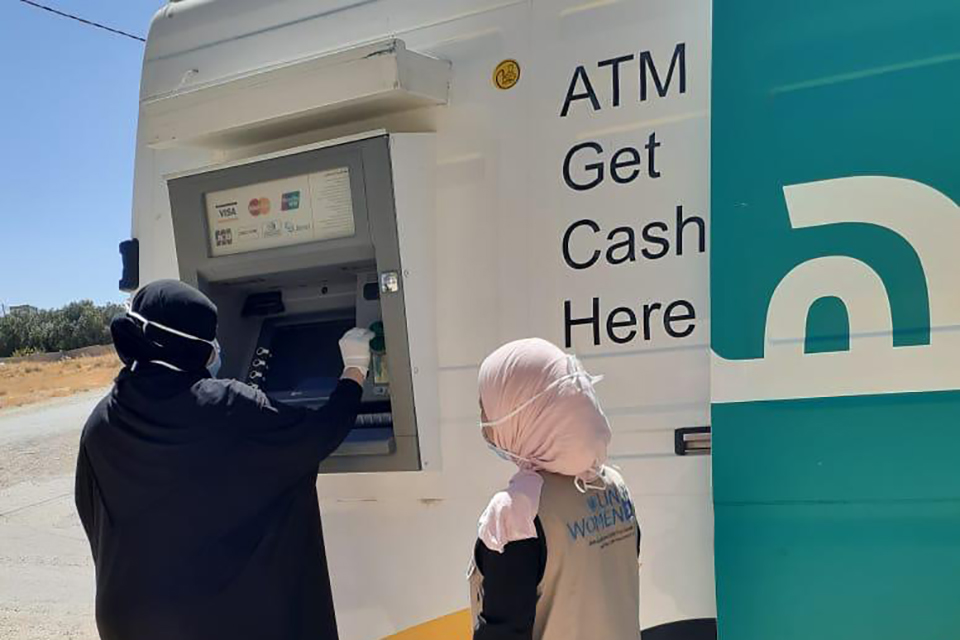Sowing seeds of hope: The women inspiring families to cultivate their resilience during times of crisis
Date:

In light of the unprecedented global crisis that has resulted from the COVID-19 pandemic, the Government of Jordan adopted an increased set of measures to prevent and respond to the health crisis, which included extended lockdowns and restriction of movement. Despite the unprecedented circumstances, women like Siham Al Qatameen and Nadia Ahmad Al-Obaydien have been working to inspire their local communities to become resilient, assist the most vulnerable and unite in the face of the pandemic.
Siham Al Qatameen, a 54-year-old Syrian refugee, resides in the rural community of Ein Albaida, in the southern governorate of Tafilah, in Jordan. Over ten years ago, Al Qatameen became the sole provider for her eleven family members.
"This period has been hard for everyone. However, the impacts have been severe on vulnerable families and women, particularly those who rely on bringing in income for their families through one member or small businesses", explained Siham Al Qatameen.
Evidence suggests that the crisis is expected to hit women’s livelihood harder. According to a rapid impact assessment conducted by UN Women, 52 per cent of women respondents stated that they do not have enough money or savings to buy enough food to maintain a supply of more than two days for their household, making the impact of the mandatory movement restrictions very difficult in terms of food security.
Al Qatameen spent years selling her homemade baked goods before enrolling as a poly-tunnel agriculture trainee in the Oasis Centre managed by the Ministry of Social Development and UN Women in Tafilah. During COVID-19, Al Qatameen has been utilizing the knowledge she gained from the training to support her community, "I used the skills I learned to cultivate herbs and vegetables in my home garden, which I gave to neighbors who are struggling financially." Al Qatameen was further inspired to share her knowledge with other women and taught them how to grow their own produce. Little she knew as she started sharing her knowledge, that this support would also boost their resilience.
"Challenges often motivate us to be stronger. So, I encourage every woman to stand up, to be strong and never say I can't do this! Everything is possible when we believe that we can make a difference."
Nadia Al Obaydien, 45, from Ein Albaida, trained alongside Al Qatameen in the Oasis Center. Like Al Qatameen, Al Obaydien has been working to support her community during COVID-19. First and foremost, she recalls how this was a time when everyone came together to support one another, "We must all work together to mitigate the spread of the virus and reduce the negative consequences as much as possible," said Al Obaydien.
The pandemic also forced many to rethink how to best use resources available. Aware of this necessity, Al Obaydien devised a practical and sustainable way to engage her community on sanitization measures, using what was already available in the house, "I wanted to encourage the people around me to protect themselves from the virus, so I developed the idea to recycle discarded soaps. Engaging children and families on the importance of hygiene through the creation of colorful and beautiful soaps." Read Al Obaydien’s story here.
Al Qatameen and Al Obaydien’s stories exemplify just two of the 600 women enrolled in the Oasis centres across Jordan who took the initiative to support other women and their communities during the pandemic. In addition to the skills their learnt, these women could also count on the continuous assistance offered by UN Women during this challenging period, including direct cash assistance, remote counselling and psychological services, and virtual support for their children on distance learning. This was possible thanks to the generous support of the Governments of Australia, Canada, Finland, France, Japan, Iceland, Italy, Zonta International Foundation, the EU Regional Trust Fund in response to the Syrian Crisis (the"Madad Fund”) and UN Women National Committees.